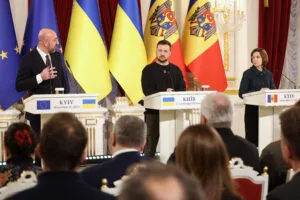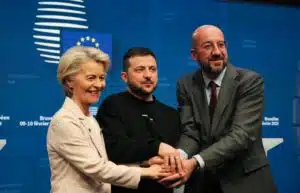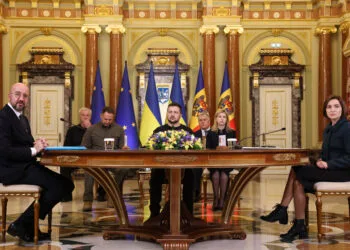Brussels – With no unwelcome last-second surprises for Ukraine and Moldova, the EU accession process can now formally begin. At the Economic and Financial Affairs (ECOFIN) Council meeting today (June 21), the 27 EU ministers voted in favour of opening negotiations with Kyiv and Chișinău, approving without discussion the item on the agenda regarding the negotiating frameworks for the two candidate countries, which from next Tuesday (June 25) will enter another box on the road that should lead them to become members of the European Union.

“The Council of the European Union adopted the EU’s general positions, including negotiating frameworks, for the accession negotiations with Ukraine and Moldova,” communicated the Belgian rotating presidency minutes before the start of ECOFIN. This marks the start of the organization of the first Intergovernmental Conferences with Ukraine and Moldova on June 25—the first between 3 p.m. and 5 p.m., the second between 5:30 p.m. and 7:30 p.m., both followed by press conferences—in Luxembourg, at the end of the General Affairs Council. The Council reports that, during the two ministerial meetings, the respective general negotiating frameworks will be presented, “setting out the guidelines and principles for the accession negotiations.” There is an air of great satisfaction in both Kyiv and Chișinău. “Ukraine is returning to Europe, where it has belonged for centuries, as a full member of the European community,” rejoiced the Ukrainian president, Volodymyr Zelensky, to which his Moldovan counterpart, Maia Sandu, echoed: “Becoming a member of the EU is our path to peace, prosperity, and a better life for all citizens.”

After the endorsement of European Council conclusions on the start of negotiations (December 2023) and on the call to the 27 ministers to adopt the frameworks “without delay” (March 2024), for weeks now, the file on the start of EU accession negotiations for Ukraine and Moldova had been hot in Bruxelles, with June 25 on the radars of the Belgian presidency and the 12 most in favour governments as the last date before the start of the handover to Hungary for the six-month leadership of the EU institution. After the first negative outcome at the Committee of Permanent Representatives (COREPER) on May 29 due to the Hungarian objections to Ukraine, Belgian negotiators worked tirelessly to smooth out Budapest’s resistance (never insurmountable, to be fair) and make it possible to reach a general understanding for the formal vote. The issue returned to the ambassadors’ table last Friday (June 14), with the new compromise text finding agreement “in principle” from all twenty-seven countries. Yesterday (June 20), the Netherlands finally positively lifted its parliamentary reservation by voting in favour, paving the way for approval in the EU Council.
Speaking of intergovernmental conferences, the 27 EU ministers also approved the Belgian presidency’s proposal to convene the 16th meeting with Montenegro in Brussels next Wednesday (June 26). The Council notes that: “The meeting will take stock of Montenegro’s progress in meeting the intermediate benchmarks of the rule of law chapters” (namely Chapter 23 on judiciary and fundamental rights, and Chapter 24 on justice, freedom and security) “and provide guidance for future work.” Podgorica is the most advanced partner on the road to joining the European Union, and in February, the Montenegrin Premier, Milojko Spajić, in an exclusive interview with Eunews, made it clear that “we will do our best to conclude the accession negotiations in 2026 and wait until 2028 for the ratification of the Accession Treaty by all member states.”
How the EU accession process works
The EU enlargement process begins with a non-EU state submitting a formal application for membership to the rotating presidency of the Council of the European Union. Union membership first requires a successful examination of the Copenhagen criteria (established at the European Council in the Danish capital in 1993 and strengthened by the EU leaders meeting in Madrid two years later). These criteria are divided into three groups of basic requests that the Union addresses to the country that has applied for membership: rule of law and democratic institutions (including respect for human rights and the protection of minorities), stable market economy (ability to cope with market forces and competitive pressure), and fulfilment of its obligations (effectively implementing the body of EU law and meeting the objectives of political, economic and monetary union).
Having obtained the positive opinion of the Commission, it comes to the conferment of candidate country status with the approval of all members of the Union. This is followed by the Commission’s recommendation to the EU Council to open negotiations which, again, requires the unanimous go-ahead of the member countries: this allows the negotiating chapters (varying in number) to be opened, the purpose of which is to prepare the candidate, particularly on the implementation of the necessary judicial, administrative and economic reforms. When the negotiations are completed, and EU enlargement is possible in terms of absorption capacity, this leads to the signing of the Accession Treaty (with terms and conditions for accession, including any safeguard clauses and transitional provisions), which must first be approved unanimously by the European Parliament and the Council.
Where does EU enlargement stand
The upheaval in EU enlargement began four days after the Russian armed aggression when, in the midst of the war, Ukraine applied for “immediate” membership in the Union, with the application signed on February 28, 2022, by President Zelensky. Demonstrating the irreversibility of a process of rapprochement with Brussels as a clear reaction to the risk of seeing its independence from Moscow erased, three days later (March 3), Georgia and Moldova also decided to take the same path. The European Council of June 23, 2022, approved the line drawn by the Commission in its recommendation: Kyiv and Chișinău became the sixth and seventh candidates for EU membership, while Tbilisi was recognized as having a European perspective in the EU enlargement process. In the EU Enlargement Package 2023 the Commission recommended to the Council to open accession negotiations with Ukraine and Moldova and to grant Georgia candidate status. All requests were then accepted by the December EU leaders’ summit, and now only the formal start of negotiations and adoption of negotiating frameworks for the first two are awaited.

Of the six Western Balkan countries that have begun the long road to EU membership, four have already begun accession negotiations (Albania, North Macedonia, Montenegro, and Serbia), one has received candidate status (Bosnia and Herzegovina), and the last has formally applied for and is awaiting the response (Kosovo). For Albania and North Macedonia, negotiations began in July 2022 after waiting eight and 17 years, respectively, while Montenegro and Serbia have been at this stage for 12 and 10 years, respectively. After six years of applying for EU membership, Bosnia and Herzegovina became a candidate on December 15, 2022, also to join the Union and at the European Council on March 21 received the endorsement to formally start accession negotiations. Kosovo is in the most complicated position since the formal request was sent in late 2022: since its unilateral declaration of independence from Belgrade in 2008, five EU member states—Cyprus, Greece, Romania, Spain, and Slovakia—continue not to recognize it as a sovereign state.
Negotiations for Turkey‘s accession to the European Union, on the other hand, were launched in 2005, but have been frozen now since 2018 due to backward steps on democracy, rule of law, fundamental rights, and independence of the judiciary. In the chapter on Turkey in the latest annual Enlargement Package presented in October 2023, it was put in black and white that “the country has not reversed the negative trend away from the European Union and has pursued accession-related reforms to a limited extent.” At the NATO summit in Vilnius in late June 2023, Turkey’s president, Recep Tayyip Erdoğan, tried to force his hand, threatening that he would only bind Sweden’s membership in the Atlantic Alliance when Brussels opens Turkey’s path back to the European Union. The blackmail failed, but the dossier on Ankara was addressed at a strategic report special meeting in Brussels.
Find more insights on EU enlargement in the newsletter BarBalcani hosted by Eunews
English version by the Translation Service of Withub









